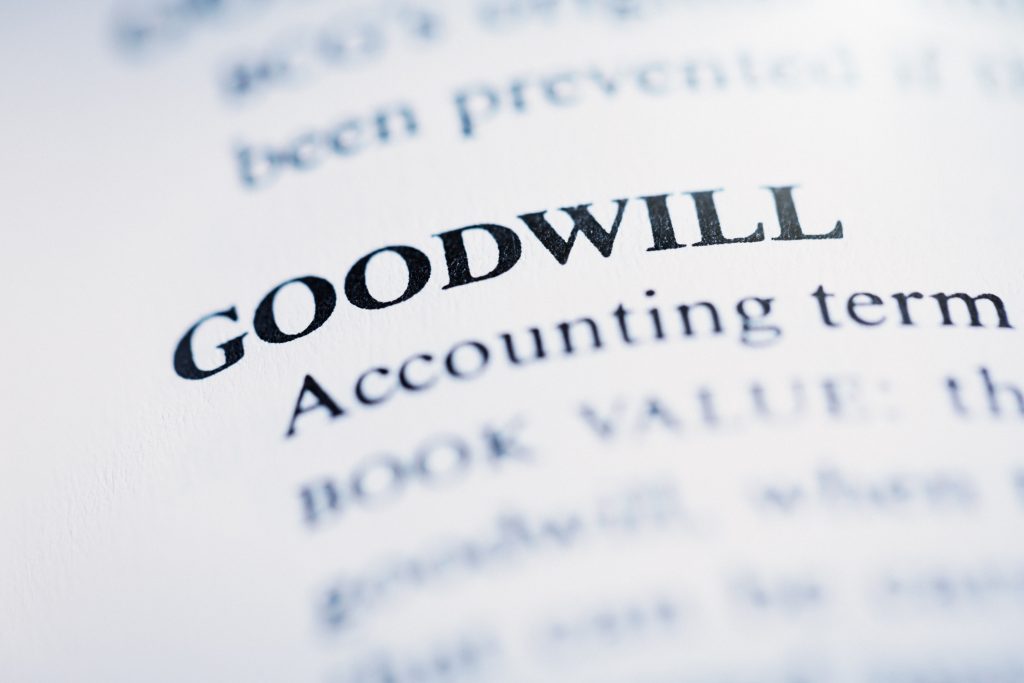
The FASB on July 15, 2020, asked its staff to research an approach that would allow public companies to amortize goodwill, an accounting technique that would enable billions of dollars of tricky intangible assets to be split out over a period.
This subsequent amortization – spreading out – of the goodwill figure better reflects what happens to goodwill in a business combination, would reduce cost, and provide simpler GAAP, according to FASB discussions.
“Acquired goodwill itself does not last forever it may be replaced with internally generated goodwill or other things, but I think there are compelling reasons to take the goodwill and consider whether – again from an economic standpoint as well as a cost benefit standpoint – amortization makes sense,” FASB Vice Chairman James Kroeker said.
Goodwill, an acquired intangible asset, comes on the balance sheet through a business combination. Goodwill is determined by deducting the fair market value of tangible assets, identifiable intangible assets and liabilities obtained in the purchase, from the cost to buy a business.
Related to amortization approaches, FASB members felt they needed more analysis about the different approaches, the pros and cons to them before providing clear leanings in this area. Most board members seemed to favor a straight line method and a default period, though no firm consensus was reached.
“One reason I supported this project on the agenda is that I did feel we have an element today of complexity in the accounting in the preparation of those numbers that wasn’t providing as meaningful information for users as we hoped it would be,” FASB member Marsha Hunt said. “So, if part of the goal of the project is cost reduction and simplicity, then I’m very comfortable with the straight line method and would probably have a bias – I’m interested in research – but it would take a lot to convince me that anything other than straight line would be practical,” she said.
Overall, board members felt that work on the topic should focus on the subsequent accounting for goodwill, and not on changes to impairment testing, stating that the board has gone as far as it can on impairment testing work.
“While I think we’ve made good progress at simplifying the goodwill impairment test, I think we’ve sort of exhausted what we can do here,” FASB member Susan Cosper said. “And so from that perspective, I think I’m interested in looking at what the broader options are in terms of how we think about the subsequent accounting for goodwill.”
Seeking Convergence with IFRS
The FASB would also seek to converge U.S. GAAP with IFRS in this area and has been working with the IASB and other standard setters that are pursuing the topic, according to board discussions.
“We will work with the IASB who has a similar project – their timing is a bit behind ours, but we’ll obviously work with them and speak with them,” FASB Chairman Richard Jones said.
The IASB has a discussion paper on the topic, the comment period for which was delayed amid the COVID-19 pandemic until the end of the year.
FASB members expressed an interest in improving the disclosure rules for goodwill, especially around the performance of an acquisition–a path the IASB is also pursuing. Board members, however, said that some of disclosures the IASB is considering would fall under management discussion and analysis (MD&A) in the U.S., an area companies have mastered and are already doing a good job with.
Goodwill Debate not Easily Settled
The FASB’s discussion sought to shore up a direction for the board to move ahead with toward developing an exposure draft for public comment that would lead to the issuance of GAAP.
Last year, the board’s Invitation-to-Comment(ITC) No. 2019-720, Identifiable Intangible Assets and Subsequent Accounting for Goodwill, did not provide any conceptually new information on the topic, but there were some new ideas gleaned regarding models that would align the timing of impairment testing for goodwill with any synergies related to acquired goodwill, a FASB staff accountant told the board.
Further staff research also revealed that financial statement users have diverse views about the utility of goodwill information, though most believe that goodwill impairment information becomes relatively less useful over time, the staff member said.
Overall, the goodwill accounting topic might not be an easy matter for the board to fix, as the debate about what to do with those figures has not been successfully laid to rest for over 75 years, FASB member Gary Buesser signaled.
Buesser pointed out that other boards since 1944 and standard-setters “have opined on this and have not come to a consistent answer”.


